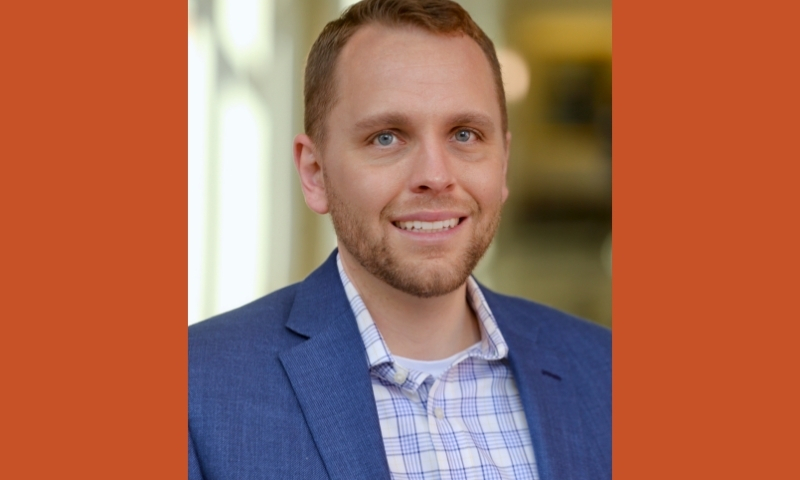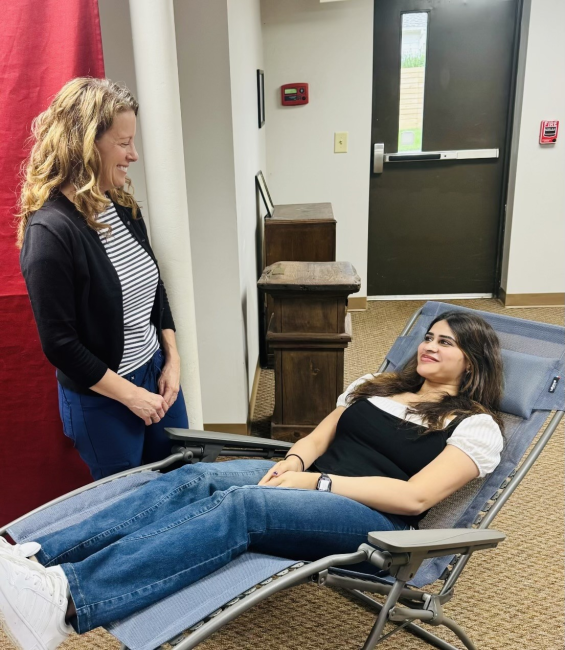Chronic pain study looks to increase access to care for underserved
The GAIN Study explores the use of community acupuncture to address chronic pain in rural and medically underserved areas, aiming to provide a cost-effective and sustainable options for non-pharmacological treatment.

The leading cause of disability for people living in the U.S., chronic pain affects nearly 20 percent of the nation’s population. Rural residents with chronic pain often face geographical barriers to treatment. Add in the well-documented opioid epidemic, and for many patients, the perfect storm of reduced access to care coupled with potentially addictive medications can pose seemingly insurmountable challenges.
School of Nursing Associate Professor Mitch Knisely, PhD, RN, ACNS-BC, PMGT-BC, FAAN, is seeking to address that very problem with an innovative new approach exploring non-pharmacological treatments for chronic pain, particularly for people in rural or medically underserved areas. The GAIN Study (Group Acupuncture for Pain Relief in Rural Communities) seeks to deliver a one-two punch to barriers for chronic pain treatment – bringing a proven tool for pain management (acupuncture) directly to rural communities.
The initiative was inspired by the issue of limited access to such treatments outside of urban centers, with people living in rural areas being significantly less likely to use non-pharmacological treatments due to unfamiliarity and lack of access. “My area of expertise is in pain management,” Knisely said. “And with the opioid epidemic, we're always looking for new non-pharmacological treatments.” The study aims to implement a cost-effective and sustainable model of community acupuncture in a rural setting.
“People living outside urban areas are 60 or more percent less likely to use non-pharm treatments,” he continued, noting that it can often be a result of a combination of unfamiliarity with the treatments and lack of access.
Knisely has partnered with the Mebane Historical Museum, offering acupuncture treatments in the nonprofit’s building in the city’s downtown region. Although it is one of North Carolina’s fastest growing municipalities, Mebane is a HRSA-designated medically underserved area, and is surrounded by large rural areas expanding into nearby Alamance and Orange Counties.
“We decided to not only make this more accessible to people, but also to take it out of the walls of the healthcare setting,” Knisely explained. “Many people don't feel comfortable walking into a medical clinic, and so that's where the partnership with the Mebane Historical Museum has proven effective.”
"The Mebane Historical Museum is an educational institute first and foremost," said the Museum's Executive Director Traci Davenport. "We consider learning about new ways to manage a chronic health issue an extension of that mission."
"The Museum has gained new visitors who were otherwise unaware of our presence or who were unaware of all of our programming and special events," Davenport continued. "Further diversifying our audience is an ongoing goal and we are pleased that this partnership has such a positive influence on that objective."
Community acupuncture, the core of the study, offers a more affordable option by treating multiple people simultaneously, significantly reducing the cost per session compared to traditional one-on-one sessions. In addition to making acupuncture more accessible financially, delivering the care in a group setting also fosters a sense of community among participants, potentially alleviating the isolation often associated with chronic pain.
“Sometimes just seeing others getting acupuncture can be a ‘wow’ moment,” said Knisely. “To be able to say, ‘I'm not the only one that may be living with this,’ can decrease the feelings of isolation.”
The GAIN Study was funded through a grant from the Betty Irene Moore Fellowship for Nurse Leaders and Innovators. Recruitment for the study has been primarily through word of mouth, with the Mebane Historical Museum playing a key role in outreach. The study has already exceeded its recruitment goals, indicating strong community interest. Future plans include expanding recruitment through social media and other channels.
The study is not just about evaluating acupuncture's effectiveness in treating chronic pain but also about assessing the feasibility and acceptability of this model in medically underserved areas. Feedback from participants will be crucial in understanding the impact of the study and how it can be scaled or adapted to other communities facing similar challenges.
Knisely’s GAIN Study represents a promising approach to chronic pain management, emphasizing community involvement, accessibility, and the potential for significant impact on individuals' lives in medically underserved areas.
